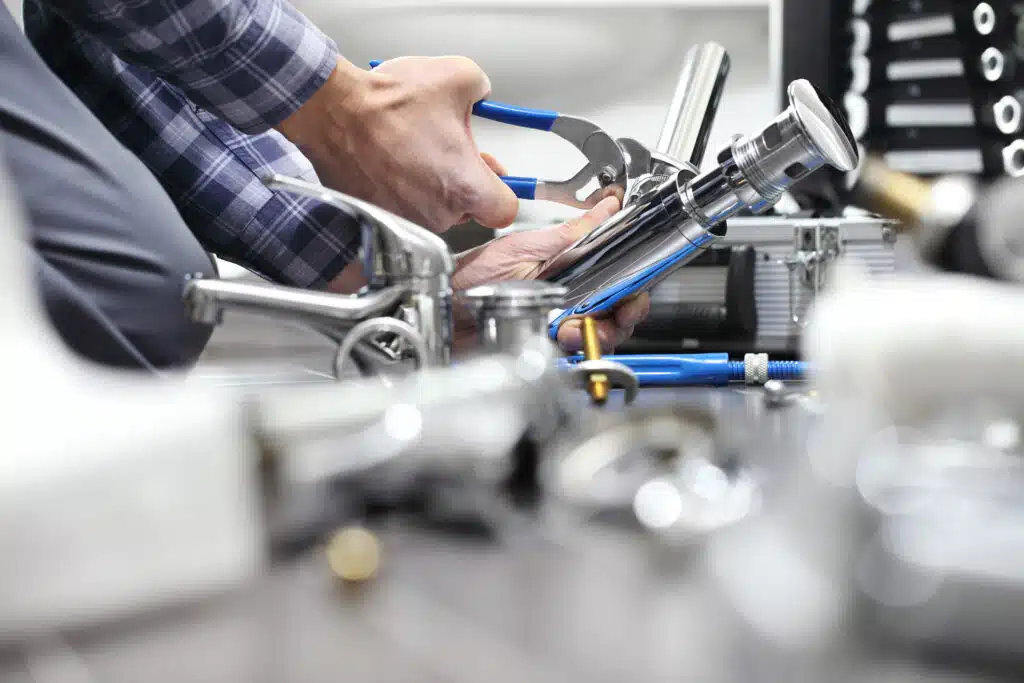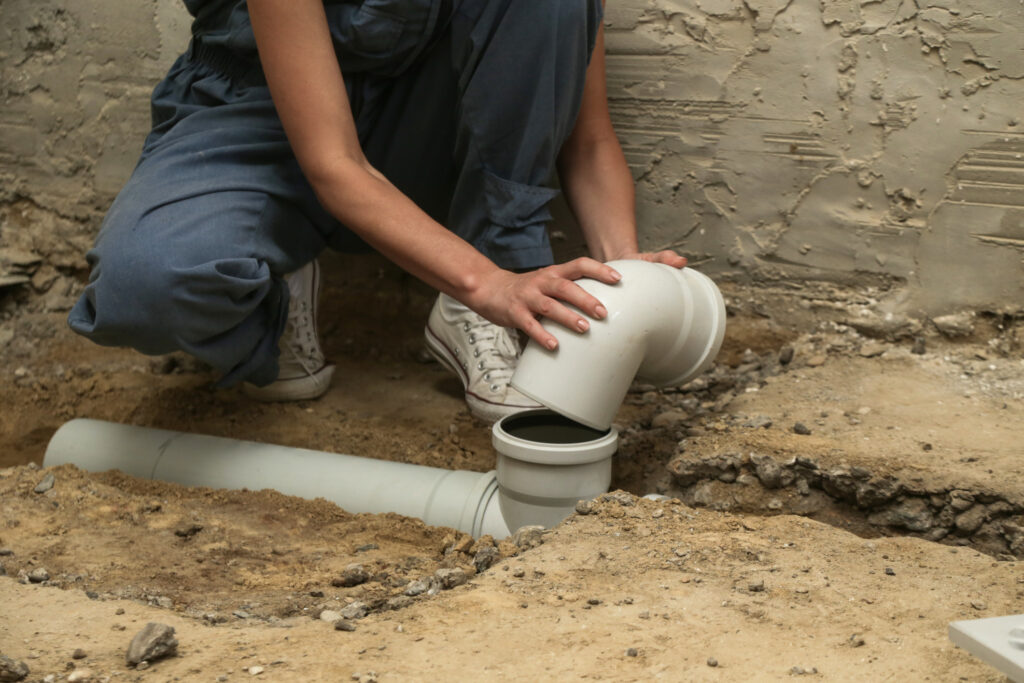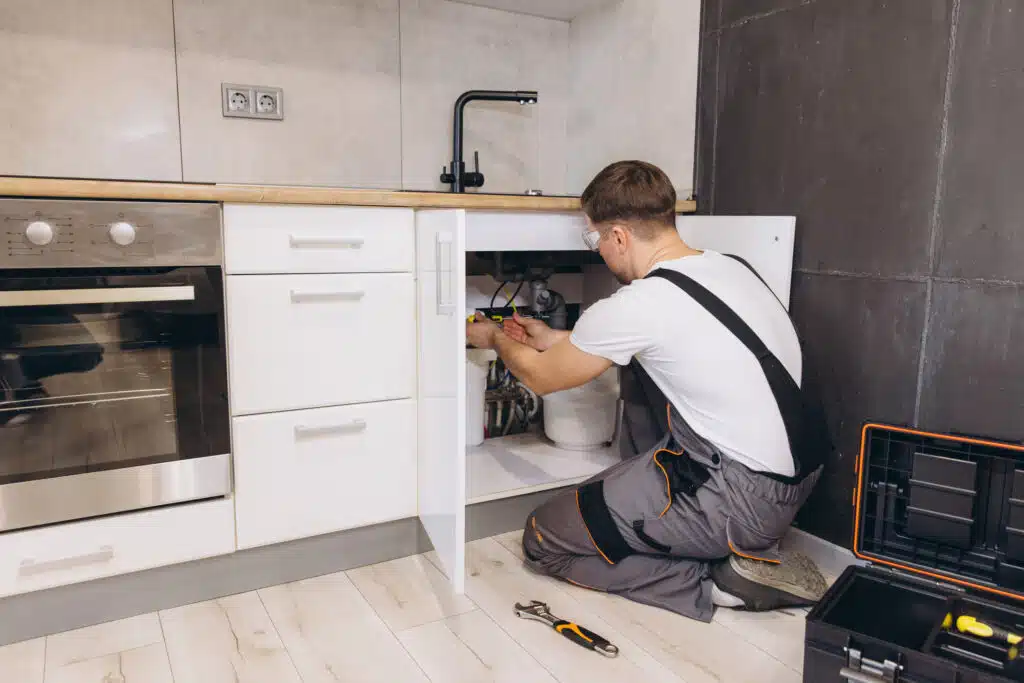Mineral buildup in your shower happens because of hard water, which leaves behind limescale deposits. This can lower water pressure and make your plumbing less efficient. You might notice discolored spots, weak water flow, or a clogged showerhead. To fix or prevent this, try cleaning with vinegar, doing regular maintenance, or installing a water softener.
Why Mineral Buildup Happens in Your Shower
Dealing with mineral buildup in your shower? You’re not alone.
For many homeowners in York, PA, tackling mineral buildup in shower fixtures is a common headache.
But what causes mineral buildup in your shower? The answer is hard water.
Hard water carries minerals like calcium and magnesium.
As water moves through your pipes and shower fixtures, these minerals harden into a chalky substance called limescale.
Limescale might seem harmless at first, but it causes real problems.
Over time, mineral buildup in your shower can accumulate inside your pipes, narrowing them and slowing down water flow.
This leads to weak water pressure, making your showers less satisfying.
The buildup also forces your system to work harder, using more energy to heat water because the limescale blocks proper heat transfer.
You might also notice reddish or brown stains on your showerhead or fixtures.
These stains come from iron compounds, like hematite, mixing with the limescale.
They’re more than just ugly marks—they’re a warning sign from your plumbing.
The good news? Catching these problems early gives you a chance to address them before they cause expensive damage.
If you’re concerned about hard water or suspect it’s already causing mineral buildup in your shower, Benjamin Franklin Plumbing of Lancaster can help.
Reach out to our skilled team for professional solutions tailored to your home.

Why Mineral Buildup is a Problem
Mineral buildup in your shower isn’t just annoying—it can impact your plumbing system.
One of the first signs is lower water pressure.
As calcium deposits (called limescale) collect in your pipes and showerhead, they block water flow.
This leaves you with a weak, frustrating stream.
It’s a common issue in hard water areas like York, PA, where water rich in minerals exacerbates the problem.
But it’s not just about low water pressure—mineral buildup can cause long-term damage to your plumbing.
These hard deposits don’t just clog; they can corrode your fixtures.
If you notice reddish-brown stains, it could mean iron-rich deposits are affecting your pipes.
If left untreated, this can shorten the life of your showerheads, pipes, and even water heaters, potentially leading to costly repairs or replacements.
Additionally, mineral buildup in shower fixtures can reduce the efficiency of your hot water system.
The buildup acts like insulation, forcing your system to work harder to heat water.
This results in increased energy use and higher utility bills.
Addressing the issue early can help maintain the health of your plumbing and keep your system running efficiently.
For professional assistance in resolving these issues, contact Benjamin Franklin Plumbing of Lancaster—your local plumbing experts ready to help.
How to Spot Mineral Buildup in Showerheads
Mineral buildup in your showerhead can sneak up on you, but it’s not hard to notice.
Start by checking the surface of the showerhead.
Do you see a chalky white, green, or brown residue? This is usually caused by limescale, a tough coating of minerals left behind when hard water dries up.
Over time, it can clog the showerhead and reduce water flow.
Another sign is uneven water spray or blocked jets.
If some nozzles shoot weak streams or no water at all, deposits from hard water are likely responsible.
Want to be sure? Remove the showerhead and inspect it carefully.
If small bits of residue fall out or are visible in the nozzles, you likely have mineral buildup in the shower.
This buildup doesn’t just look bad—it affects how your plumbing works too.
Reduced water flow can stress your plumbing system and make your shower less effective.
On top of that, reddish-brown residue often means there’s iron, which is common in hard water areas like York, PA.
Spotting these early signs can help keep your shower working well.
For persistent buildup or any concerns with water quality, reach out to Benjamin Franklin Plumbing of Lancaster for professional solutions.
Mineral Buildup in Shower Pipes: What to Look For
Mineral buildup in shower pipes can be hard to notice at first, but it can cause big problems over time.
One common sign is lower water pressure.
If your strong shower has turned into a weak drizzle, hard water deposits might be clogging the pipes.
These buildups, mostly made of calcium and sometimes iron, slowly block water flow and make your plumbing less efficient.
Another warning sign is uneven water temperature.
Deposits in hot water pipes can trap heat, making your shower too hot or not hot enough unexpectedly.
This not only disrupts your comfort but also forces your water heater to work harder.
You might also see reddish-brown stains on fixtures or notice discolored water.
These are signs of iron in the pipes, which can cause rust and damage if not fixed.
Catching these problems early can save you money and prevent bigger issues.
For safe and reliable repairs for mineral buildup in shower plumbing, trust Benjamin Franklin Plumbing of Lancaster to get your pipes working like new in York, PA.
Is Hard Water the Problem?
Hard water might be the reason behind mineral buildup in your shower.
But what is hard water? It’s water with lots of calcium and magnesium.
As it flows through your pipes, these minerals stick to surfaces and leave behind a chalky, stubborn residue—commonly called limescale.
Over time, this buildup doesn’t just look bad; it clogs pipes, slows water flow, and hurts your shower’s efficiency.
In York, PA, hard water isn’t rare—it’s common.
The local water has a lot of minerals, so homes here often deal with stubborn residues in their showers.
The problem gets worse with hot water.
When hard water heats up, it forms tougher deposits in your pipes.
This isn’t just about looks.
Blocked pipes and showerheads strain your plumbing, use more energy, and can cause costly damage.
On top of that, reddish-brown streaks can show up from iron in the water, making things worse.
If your shower isn’t working like it used to, mineral buildup could be to blame.
Don’t let buildup ruin your morning routine—reach out to Benjamin Franklin Plumbing of Lancaster for a professional assessment and tailored solutions to protect your home’s plumbing!
Spotting Signs of Mineral Buildup
Identifying mineral buildup in shower areas is simple and doesn’t require special tools.
Here are a few easy ways to detect the problem early.
First, take a close look at your showerhead and fixtures.
Do you see white, chalky spots or reddish stains?
The white residue is often limescale, made of calcium, while reddish stains suggest iron in your water.
Both are signs that minerals may be accumulating.
Next, check the water flow.
Mineral deposits can clog nozzles, reducing pressure and causing uneven sprays.
Run the shower and observe.
Is the water flow weaker or uneven?
This could indicate buildup inside the plumbing.
These simple observations can help determine whether hard water might be causing issues with mineral buildup in your shower.
However, addressing hard water or plumbing problems often requires professional expertise.
If you suspect a larger issue in your York, PA home, turn to Benjamin Franklin Plumbing of Lancaster for a thorough inspection and reliable solutions!
Mineral Buildup in Showerheads: When to Call a Professional
Mineral buildup in the shower can mess up your water flow, but handling it properly is essential to avoid damage.
While over-the-counter remedies can help, persistent issues may require professional attention.
If you’re experiencing hard water in York, PA, read on for solutions and tips that could help.
It’s recommended to keep showerheads clean by wiping them regularly with a damp cloth to reduce mineral deposits.
For those living in areas prone to hard water, installing a showerhead filter might be an effective preventive solution.
However, if buildup persists or if cleaning doesn’t restore proper water flow, the problem might stem from your home’s water system.
In such cases, avoid excessive DIY attempts, as they may risk damaging your plumbing.
Instead, call the experts at Benjamin Franklin Plumbing of Lancaster.
They can inspect your water system and provide long-term solutions to restore full functionality.
Reach out to our team to make sure your plumbing stays in top shape!
Preventing Mineral Buildup in Shower
Keeping your shower fixtures free of mineral buildup in the shower doesn’t have to be hard.
A little regular care and a few simple steps can help keep things working well and lasting longer.
Start by cleaning regularly.
A quick wipe with a mild cleaner or a mix of vinegar and water can stop early buildup before it hardens.
Rather than attempting to address tough buildup yourself, if you notice hard-to-remove limescale, it’s best to contact Benjamin Franklin Plumbing of Lancaster for professional assistance to avoid damaging your fixtures.
To cut down on mineral deposits, think about adding a shower filter.
These filters help limit excessive minerals, like calcium, in York, PA’s mineral-heavy water before they stick to your fixtures.
Make sure to check and replace the filter cartridges as directed by the manufacturer to keep them working properly.
Proper ventilation is also important.
Make sure your bathroom has adequate airflow to help reduce condensation and humidity, which contribute to mineral deposits over time.
With regular care and expert guidance when needed, you can prolong the life of your plumbing fixtures and avoid unnecessary problems.
Trust Benjamin Franklin Plumbing of Lancaster for any fixture maintenance or repair needs!
Long-Term Fixes for Mineral Buildup
Dealing with persistent mineral buildup in shower fixtures can feel like it never ends—but there are lasting fixes.
One effective way to tackle buildup is by consulting professionals who may recommend solutions like water softeners.
Hard water, full of minerals like calcium and magnesium, is often what causes limescale in pipes and fixtures.
A water softener system, professionally installed, can help significantly reduce these issues over time.
For homeowners in York, PA, where hard water is common, another potential solution is a whole-home water filtration system.
These systems can remove not only hard water minerals but also sediment and iron, which may cause reddish or brown stains in your shower.
Installing these systems can improve water flow, extend the life of your pipes, and ensure your shower functions efficiently for years.
If you’re managing frequent buildup, resolving it early can help avoid costly repairs later.
Speak with the trusted experts at Benjamin Franklin Plumbing of Lancaster today to discuss the best options for your York home’s water and plumbing needs.
When to Call a Plumber
Dealing with mineral buildup in your shower might seem like a minor hassle, but there are times when you should call a plumber.
Persistent low water pressure, uneven water flow, or discoloration on your shower fixtures could point to significant blockages or heavy limescale deposits.
These issues often require specialized tools and expertise to resolve properly.
While some homeowners may attempt temporary fixes like soaking the showerhead in vinegar, these methods don’t tackle the more severe problems within the plumbing system.
For instance, calcium deposits deep in the pipes or iron stains often need professional intervention.
Another red flag? If you notice hot water pressure dropping more quickly than cold water pressure, it may signal buildup within your hot water system.
If you’re in York, PA, a skilled plumber, like the team at Benjamin Franklin Plumbing of Lancaster, can diagnose the root cause of the problem and provide a lasting solution.
From professional descaling to expert water treatment options, they can restore your water flow and help prevent future buildup.
Don’t wait for a small issue to escalate into a costly repair—reach out to the experts to protect your plumbing system.
Why Professional Plumbing Services Matter in York, PA
If you’re battling mineral buildup in your shower, enlisting the help of a pro plumber is one of the most effective ways to resolve the issue.
Persistent mineral buildup in your shower can lead to a range of plumbing problems that require expert attention.
Benjamin Franklin Plumbing of Lancaster provides York, PA residents with the expertise and equipment needed to address these persistent problems.
Professional plumbers go beyond the surface signs of limescale—they investigate underlying issues within your pipes.
Small concerns like reduced water flow or poor pressure can escalate quickly if left unaddressed.
Deposits of calcium and iron, often caused by mineral buildup in your shower, can clog pipes, reduce efficiency, and even shorten the lifespan of your plumbing system.
Professionals ensure thorough removal of buildup and inspect your plumbing system for potential vulnerabilities.
What sets professional services apart is their focus on long-term prevention.
They don’t just provide temporary fixes—they deliver durable solutions.
From installing water softeners to recommending tailored tools and treatments, plumbers help you choose options that are ideal for your home in York, PA.
By hiring skilled professionals, you’re not just addressing an immediate problem—you’re safeguarding your plumbing system for the future.
You’ll benefit from dependable service, expert insights, and a shower that functions as it should.
It’s peace of mind and a lasting improvement for your home.
Why York, PA Homeowners Have Water Problems
In York, PA, the water is hard, meaning it has a lot of minerals like calcium and magnesium.
These minerals often lead to mineral buildup in shower fixtures and plumbing systems.
Over time, this buildup leaves deposits in pipes, showerheads, and fixtures.
It can block water flow, weaken shower pressure, and even harm your plumbing.
While hard water is common in many places, York’s water has more minerals than usual, which makes the problem worse.
Limescale, mainly made of calcium carbonate, can create crusty layers inside pipes, especially in hot water systems.
On top of that, iron sometimes mixes with the limescale, leaving rusty stains that are hard to remove.
To prevent issues like mineral buildup in shower systems, York homeowners should get regular plumbing checks and take early action.
Ignoring the problem can lead to reduced plumbing efficiency and shorter plumbing lifespans.
Working with a professional plumber, like Benjamin Franklin Plumbing of Lancaster, can help you tackle York’s water problems and protect your home.

FAQs
What are the signs of mineral buildup in showerheads?
You might notice low water pressure, uneven spray, or crusty white, green, or reddish spots on the showerhead. These are common signs of limescale and buildup caused by minerals in the water.
How does hard water in York, PA lead to this issue?
York, PA has hard water with high levels of calcium and magnesium. These minerals accumulate on your showerhead, forming a limescale that blocks water flow and reduces efficiency.
Can I clean my showerhead myself?
Homeowners can try basic solutions like soaking the showerhead in white vinegar, which may help loosen some mineral buildup in the shower. However, if the problem persists or the buildup is severe, it’s best to seek professional assistance to avoid damage to the fixture.
How can I tell if my pipes are affected?
If water pressure stays low, hot water takes longer to heat, or the water looks discolored, it might mean buildup in your pipes. A professional should check it out.
When should I call a plumber for this?
If soaking the showerhead doesn’t fix the issue or you think your pipes are clogged, call Benjamin Franklin Plumbing of Lancaster. They can clean your plumbing and suggest ways to prevent future buildup.





















